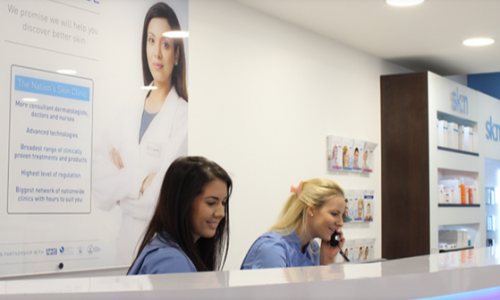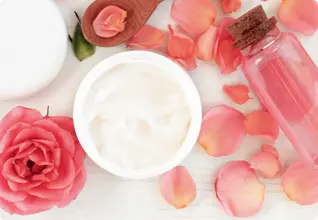Do these lifestyle choices really put you at risk of acne? Our experts reveal all

If you suffer from acne, you probably know how stubborn this condition can be, and despite its prevalence, experts have yet to reach a consensus as to what actually causes it.
While professional treatments remain the proven go-to solution, many people are becoming increasingly aware of their lifestyle choices as means to reduce their risk of developing acne. But which ones really put you at risk of acne? From smoking and “being on the pill” to how we choose our makeup, our experts reveal all.
What causes acne?
Acne is a skin condition that causes spots, oily skin and sometimes makes skin feel hot or painful to the touch. It can appear on the face, back and chest and varies in severity from mild to moderate and severe.
Acne is caused by an overproduction of oil (sebum) from the sebaceous glands, which are located in the inner layer of the skin known as dermis. The excess release of oil results in the build-up of dead skin cells which blocks and clog pores. This bacterial blockage develops into whiteheads, blackheads, papules and cysts experienced during an acne flare.
There are many causes of acne. Hormones, gender and genetics can influence the likelihood of developing acne, as well as some external, lifestyle risk factors. Aggressive episodes can also be triggered by cosmetic products, medication and smoking.
Hormones and acne
Hormone sensitivities, fluctuations and imbalances can be one cause of acne. This type of acne can cause spots to appear on the forehead, nose and chin. Depending on the severity, it can take the form of blackheads, whiteheads, small spots and hard, boil-like nodules and cysts (known as cystic acne).
Testosterone can cause acne and since the sebaceous glands are sensitive to hormones, sudden overactivity along with the increased production of this hormone, and others, can cause the glands to overcompensate by producing more sebum.
Women are also more likely to develop adult acne than men. As women undergo consistent fluctuations of hormones whilst menstruating, during pregnancy and menopause, this can increase a woman’s proneness to acne flares.
Does makeup cause acne?
Some make-up can cause mild acne. This form of acne is called acne cosmetica and can appear on any part of the body where cosmetic products are applied.
Wearing heavy makeup can clog the pores, resulting in product build-up, debris, oil and dead skin cells. Dirty makeup brushes can also worsen acne as these act as means to enable the spread of bacteria. Regularly washing your brushes can reduce reapplying any acne-causing bacteria back onto your face.
For acne-prone skin, water-based emollients and cosmetics will least aggravate the symptoms of acne. Water-based products contain less or no oil and are described as non-comedogenic. This means they will not clog pores like heavier, thicker cosmetics do.
Does smoking cause acne?
Smoking has many detrimental effects to the body and skin. To your appearance, smoking deprives your skin of nutrients, depletes your complexion and accelerates ageing.
The correlation between acne and smoking is blurred as there is no clear research that suggests causality. Existing research noted that smoking can worsen pre-existing acne and stopping smoking can relieve the symptoms of acne.
As smoking reduces blood flow to the skin’s surface and delays wound healing, once you quit and your oxygen levels are replenished and returned to normal, the spots, discolouration and marks created by acne can heal faster.
Does stress cause acne?
Cortisol is one of the stress hormones produced by the body and as acne is often triggered by fluctuations in hormone levels, being stressed can worsen any existing acne.
Can the pill cause acne?
Usually, combined contraceptive pills are prescribed as a treatment for acne, yet occasionally, the progestogen-only pill (also known as mini pill) and implant can actually worsen the symptoms of acne.
As the mini pill and implant both contain progestogen, this hormone can disturb the skin’s natural balance and result in the overproduction of oil within the sebaceous glands.
Does sweat cause acne?
Hot weather and intense exercise causes the body to sweat. As the body becomes hotter, sweat is produced to help control the body’s rising temperature and the combination of heat and moisture becomes the perfect environment for bacteria to thrive in.
As acne is caused by the build-up of bacteria and debris, sweat particles can also contribute to the clogging of pores and inflame acne further.
Does diet affect acne?
The link between acne and diet has always been controversial, however, recent research suggests that certain foods may indeed cause or increase the risk of developing acne. These include dairy products, refined sugars and whey protein.
Learn more acne and diet here.
Does masturbation cause acne?
Despite popular belief, masturbation does not cause acne. While masturbation can influence hormone levels, these are not significant enough to trigger the development of acne or have an impact on your skin health.
When to see a doctor
If you suffer with moderate or severe acne and pharmacy grade creams and medication has not helped, professional help can be sought. Your doctor may prescribe topical retinoids, antibiotics and, for women, the contraceptive pill to combat and reduce the symptoms of acne.
If you cannot determine the cause of your acne, having a consultation with one of our dermatologists can help. By creating a bespoke treatment plan, including the use of clinically proven products, advanced acne treatments and the best aftercare advice, you can achieve significant results in the pursuit for clearer skin.
Some professional treatment options are:
HydraFacial
HydraFacial is a brightening, deeply cleansing and exfoliating treatment for rejuvenating results. It features a six step process to lift impurities, regulate oil levels and improve the appearance of acne scarring.
Skin peels
Skin peels are regenerative, exfoliating treatments that encourages the growth of new skin cells. Chemical peels use a skin-nourishing blend of ingredients to target blemishes, reduce red pigmentation and soothe inflamed skin.
Blue light therapy
Isolaz (Blue Light Therapy) is a preventative, combined treatment that uses vacuum suction action and light-based devices to shrink the oil glands. Blue light therapy deeply cleans the pores and removes oil and debris from the deepest layers of skin to prevent future outbreaks.
Laser peels
Laser peels are stimulating laser treatments that accelerate the skin’s natural healing process. Effective in treating mild to moderate acne, laser peels are used to reduce the appearance of scars, pigmentation and uneven skin tone.
At sk:n, all of our acne treatments are tailored to your needs, simply find your nearest clinic and request a consultation with one of our acne experts.
Related Articles

08
Apr 2024

08
Apr 2024
Request a callback
One of our friendly sk:n advisors will call you to book your consultation.
- More than 450 consultants, doctors, nurses and medical practitioners
- Regulated by the Care Quality Commission, Health Inspectorate Wales and Health Improvement Scotland
- Partner of the NHS
- Rated excellent by our clients on Trustpilot
- Strict safety and care protocols











